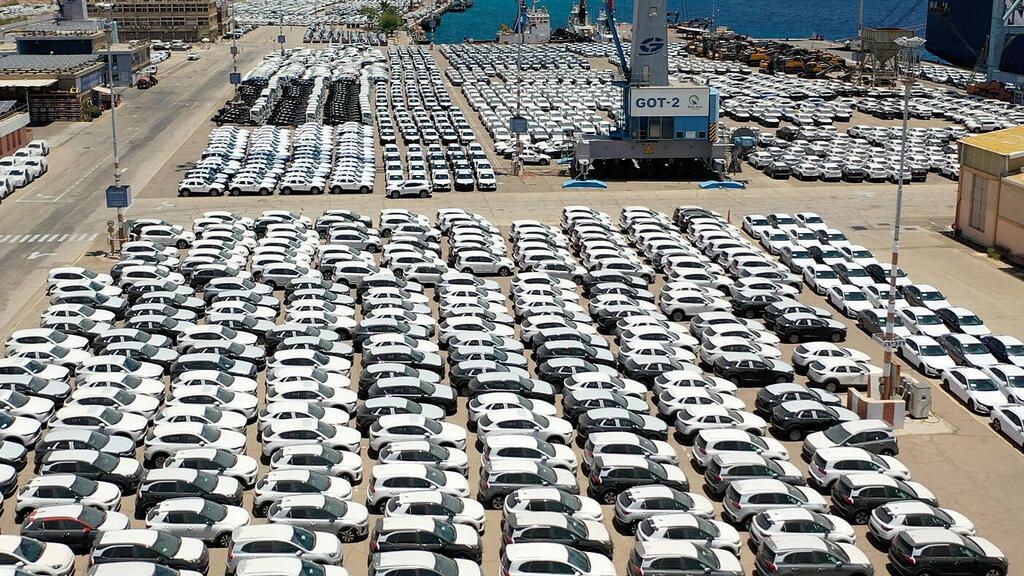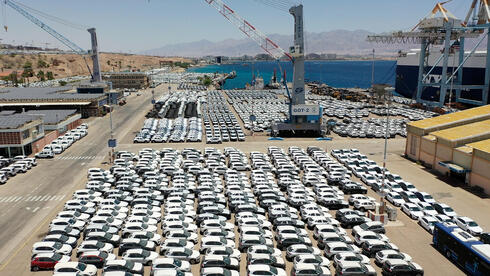
ISRAEL AT WAR
Eilat port sees revenue drop 80% due to Houthi attacks
Israel's southern port has suffered badly since the beginning of the attacks from Yemen. Port of Eilat CEO Gideon Golber said that following the escalating crisis, the port management will ask the state for compensation for the loss of some of the revenue, and warns that a flare-up with Hezbollah will also expose the ports of Haifa and Ashdod to danger and disrupt all shipping traffic
Against the background of the intensifying threat of the Houthi rebels in Yemen to attack ships passing through the Bab-el-Mandeb strait towards Israel, the Port of Eilat reports a sharp decrease in the scope of activity and a drop of more than 80% in revenue within a month.
In an interview with Calcalist, the director general of the port, Gideon Golber, said that following the escalating crisis, the port management will ask the state for compensation for the loss of some of the revenue. According to him, "Since the Houthis announced the blocking of Bab-el-Mandeb, ships are afraid to pass through on their way to Eilat and choose a route that bypasses the entire African continent in a way that extends the duration of the trip by about 20 days. This is how the ships enter the Mediterranean Sea through the Straits of Gibraltar and from there they continue to the ports of Haifa and Ashdod and there is no point in them passing through the Suez Canal to the port of Eilat. This situation puts us at a serious disadvantage."
The Port of Eilat is considered Israel's southern goods gateway and its only gateway to trade with countries in the Far East and Australia, without the need to go through the Suez Canal. Its activity is mainly characterized by the export of goods, such as potash and minerals to China, India and other countries in the East, the import of cattle from Australia and the import of cars from the Far East, especially from China, South Korea and Japan. The import of vehicles from the East is considered the most active industry in the southern port and it accounts for about 75% of all the activity that takes place there.
The drop in the number of vessels arriving at the Port of Eilat began about three weeks ago, when the Houthi rebels in Yemen took over the cargo ship Galaxy Leader, owned by Israeli businessman Rami Ungar and leased to the Japanese shipping company NYK. The ship was used to transport vehicles and after it was taken over by Houthi militants, it was taken to the port of Al-Hudaydah in Yemen with about 25 foreign crew members who operated it and were captured on board.
According to the CEO of the Port of Eilat, NYK fears that if it continues to send ships to the Red Sea on their way to one of Israel's seaports, the Houthis will harm the crew members of the hijacked ship. Because of this, it ordered the vessels it operates to divert their route to ports in Europe. “About 45% of the total car imports to Israel and about 5% of all the goods imported to Israel by sea move through the port of Eilat. In the current situation, Israel needs to form a coalition of countries to deal with the new situation. In 1967 and 1956, wars broke out following the closure of the Straits of Tiran. In such situations it is better to have multinational forces that operate regularly, from land and sea, to ensure the free movement of ships in international shipping lanes. It’s inconceivable for a militant group of one kind or another to impose a naval blockade on Israel," he said.
Related articles:
The Houthis, in an effort to restrict maritime traffic to Israel, are making strategic moves following the recent conflict in Gaza, aligning themselves with Hamas. In the initial days of the conflict, they showcased solidarity with Hamas by launching barrages of ground-to-ground missiles, cruise missiles, and drones at Israel. These attacks were intercepted by Israel's air defense system, including Arrow missiles, and by American forces in the Red Sea. Recent weeks have seen the Houthis targeting ships in the Arabian Sea, raising concerns about their alleged connections to Israel. The group, having seized substantial portions of Yemen, is widely viewed as an Iranian-backed faction, equipped predominantly with Iranian-manufactured weaponry.
"Until the outbreak of the war in the south, they did not talk to us at all about any threat from the Houthis and we were not exposed to any attribution scenario related to them. There may have been talks about it in other places, but not with us," Golber says. According to him, "Now someone here needs to wake up and demand a solution to this situation. The non-arrival of ships to Eilat means that there is no income for the port, while the fixed expenses for its maintenance and operation remain the same and we have a substantial negative flow."
In recent days, Golber addressed the Director General of the Ministry of Finance Shlomi Heisler and warned that an all-out war with Hezbollah could expose the seaports in Ashdod and Haifa to attack by the Shiite organization that possesses a variety of missiles and means capable of disrupting all vessel traffic in Israel. He warned that if a situation were to materialize in which ships will not frequent the seaports in Israel, along with the continuation of the siege by the Houthis, the damage to the economy will be much more extensive since 98% of all its imports and exports are done by sea.
The Eilat Port was privatized in 2013 and the Nakash brothers purchased it from the state through Papo, a shipping company which they own, in exchange for NIS 122 million as part of an agreement until 2028 with an option to extend it by another decade. It employs about 180 workers.
A senior government official told Calcalist that Eilat port is in a position to absorb the damage caused by the Houthis' actions at this stage. According to him, it is evident that in the last year the income has increased significantly thanks to an increase in demand for electric cars and the extensive import of such vehicles from the Far East. According to the source, at least 50,000 new cars imported to Israel are still parked at the back of the port these days. "Right now, they are not collapsing and the port can absorb a drop in revenue. The question is how long the current situation will last," he said.
Acting CEO of the Israel Ports Company Tiko Gadot said that the Houthis' actions in the Strait of Bab-el-Mandeb are a concern for the entire international community that uses shipping lanes, as well as a distinct interest of Egyptians for whom the passage of ships in the Suez Canal is a significant source of income.
He added that the establishment of the private ports in Haifa and Ashdod since the beginning of the war made it easier to regulate the movement of vessels from Ashdod to Haifa, and this when in the first weeks of the fighting in Gaza, many companies diverted their vessels that were on their way to the port of Ashdod to the port of Haifa in a way that created a surplus for the porters at the unloading docks and this without creating operational traffic jams at the entrances to the ports.
